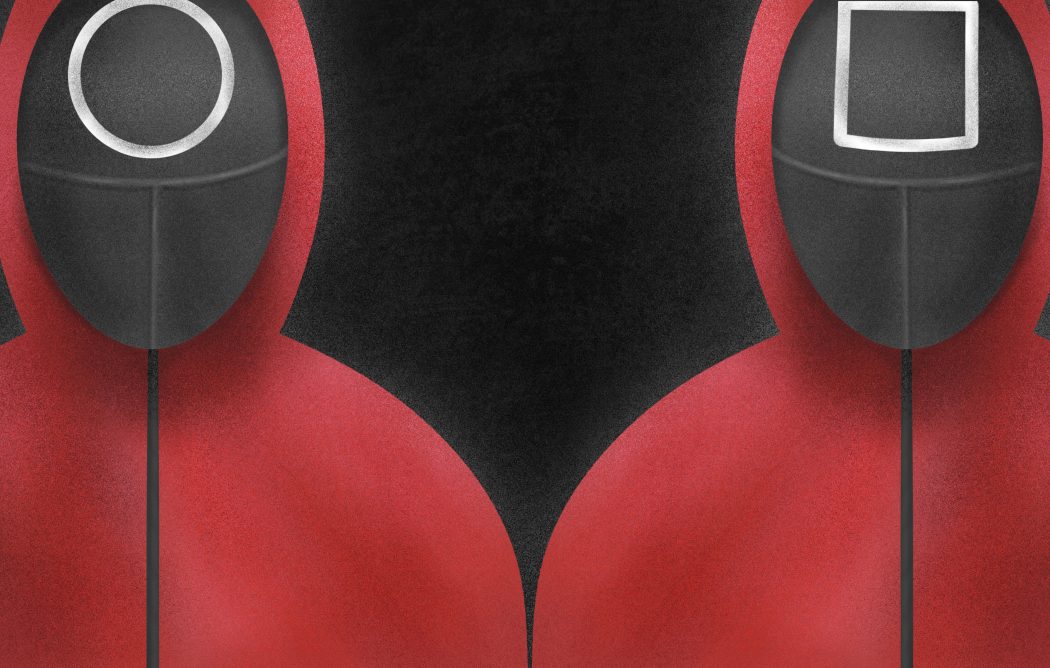In so many words, Squid Game is a South Korean survival drama about gamblers and debtors of all stripes—a chauffeur, a failed investor, a North Korean defector, an exploited Pakistani mechanic—being reduced to numbers and bloodied tracksuits in upscaled, hyperviolent, and winner-takes-all versions of childhood games. In so many words, its premise and aesthetics are a tight if predictable mesh of influences from Battle Royale, Kaiji: Ultimate Survivor, and Alice in Borderland. In so many words, the show came out, blew up, and despite some exceptional moments, is not itself an exception to the rule that capitalism loves anti-capitalism; the rule that, played safely enough, rebellion and social commentary sell very, very well.
Of course, it’s no surprise—even if the irony is especially brutal here—that some viewers clamoured for the tracksuits we were already metaphorically wearing anyway, and that some can now buy t-shirts with their own custom player numbers. You don’t need to be reading from the Critic’s Notebook or even know any of the specific works I referenced in the first paragraph to glean that Squid Game is a fairly paint-by-numbers take on the demented game genre, complete with, surprise, a depraved and mostly Western elite cabal orchestrating these games annually, just for kicks, for bets of their own. The show might be largely predictable, but I (and, as of writing, over 100 million people) admire the narrative tightness in spite of the visual bric-a-brac, how the show gathers so many of its genre’s tropes under a single honeycomb umbrella.
The show came out, blew up, and despite some exceptional moments, is not itself an exception to the rule that capitalism loves anti-capitalism; the rule that, played safely enough, rebellion and social commentary sell very, very well.
But Squid Game’s sugar-coated social commentary is where the show cracks around the edges.
If anything, the commentary is most salient in the first few episodes: just as we get ready for the games to proceed from the end of episode one, the second episode takes us off the mysterious remote island, after the game is terminated by the players’ majority vote. Instead of funneling the players straight into another pastel deathtrap, we get to see a few of them run into the dead-ends of the lives they returned to. The one genuine exercise of democracy—through a clause written into the very rules of the game, mind you—leads them to another circle of Hell Joseon; whether it’s a higher or lower circle is hard to tell, if the difference is even there. When poverty already forces people to play a game they never agreed to, of course you’d rather know the rules, play for an escape made tangible, a future dangling from the ceiling like a claw catcher with a capsule toy.
As Kathryn vanArendok wrote for Vulture, the discourse around Squid Game itself is a multi-faceted (or multi-tentacled) thing, but the one that has latched onto me most stubbornly is how its global popularity undercuts its local politics. In Capitalist Realism, Mark Fisher coined the term “precorporation” to describe how mainstream media preemptively takes any modicum of political subversion and turns it into an image, a product, a brand. The example he gives is Kurt Cobain pushing back against MTV in the 90s only for Nirvana to eventually become well and truly the poster child for rebellious angst: a cultural raw nerve turned into a market demographic, a t-shirt that has nothing to do with the band but the posture it represents.
Despite wielding the guns and the power to kill, the henchmen were not the people pushing the buttons from on high.
It is interesting then, that so much of the show’s political aftershock has centered around what the costumes represent to its audience in South Korea and abroad. On one hand, global audiences can buy Netflix-licensed merchandise with customized player numbers—another example of the precorporation phenomenon. On the other hand, about 80,000 workers in South Korea, donning the red hoodies and black masks of the game’s henchmen, recently went marching through Seoul in protest against job insecurity and poor wages. Despite wielding the guns and the power to kill, the henchmen were not the people pushing the buttons from on high.
Put aside the show’s content and look at its context. South Korea is a country beset by income inequality, in turn driven largely by the economic stranglehold of the chaebol (wealthy family conglomerates like Samsung and LG, who first arose in the 1960s, aided by the government via tax breaks, special loans, and so on). In the shadow cast by this bourgeois nepotism, Koreans between the ages of 20-30—the N-Po generation—have increasingly given up on any idea of a stable future, of owning a home, finding a job, marrying and having kids. Between their erased futures and the intense pressures of the day-to-day, this generation is caught in a Korea that leaves its workers behind but pushes towards the cutting edge of tech and pop culture, in a hyperconsumerist society that can’t buy into a promise of stability.
But what is perhaps less obvious, and more insidious to think about, is the possibility that Squid Game will be the first success story on modelling an increasingly popular market: dystopian fiction that is specifically about one culture’s form of late capitalism, yet has its political critiques overshadowed by its very popularity around the world.
If, as Mark Fisher has it, anything subversive is “doomed to endlessly repeat older gestures of rebellion and contestation as if for the first time,” Squid Game’s reception seems a multi-layered confirmation of his ideas. There is the immediate cashing-in on the show’s global popularity, sure, but the recent protests in South Korea appropriating the henchmen’s costumes echo the use of the Guy Fawkes mask in any number of protests around the world, from Occupy Wall Street in 2011 to the 2019-2020 Hong Kong protests. It goes without saying that merchandise from the show—sold as a Netflix shop exclusive, bought as a Halloween costume, or worn as a symbol of protest—takes on different political valences depending on who wears it (and where). But what is perhaps less obvious, and more insidious to think about, is the possibility that Squid Game will be the first success story on modelling an increasingly popular market: dystopian fiction that is specifically about one culture’s form of late capitalism, yet has its political critiques overshadowed by its very popularity around the world. Of course there is going to be another season of Squid Game, or at least more wildly successful Netflix-exclusive content that insists there is no way out of this mess. Wanna bet?








